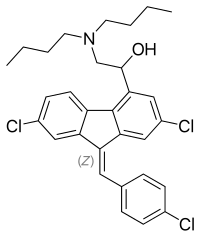Lumefantrine
Appearance
(Redirected from C30H32Cl3NO)
 | |
| Clinical data | |
|---|---|
| AHFS/Drugs.com | International Drug Names |
| MedlinePlus | a609024 |
| Routes of administration | Oral |
| ATC code |
|
| Legal status | |
| Legal status |
|
| Identifiers | |
| |
| CAS Number | |
| PubChem CID | |
| DrugBank | |
| ChemSpider | |
| UNII | |
| KEGG | |
| ChEBI | |
| ChEMBL | |
| CompTox Dashboard (EPA) | |
| ECHA InfoCard | 100.133.797 |
| Chemical and physical data | |
| Formula | C30H32Cl3NO |
| Molar mass | 528.94 g·mol−1 |
| 3D model (JSmol) | |
| Melting point | 130 to 132 °C (266 to 270 °F) |
| |
| |
| | |
Lumefantrine (or benflumetol) is an antimalarial drug. It is only used in combination with artemether. The term "co-artemether" is sometimes used to describe this combination.[1] Lumefantrine has a much longer half-life compared to artemether, and is therefore thought to clear any residual parasites that remain after combination treatment.[2]
Lumefantrine, along with pyronaridine and naphthoquine, were synthesized during the Chinese Project 523 antimalaria drug research effort initiated in 1967; these compounds are all used in combination antimalaria therapies.[3][4][5]
See also
[edit]References
[edit]- ^ Toovey S, Jamieson A, Nettleton G (August 2003). "Successful co-artemether (artemether-lumefantrine) clearance of falciparum malaria in a patient with severe cholera in Mozambique". Travel Medicine and Infectious Disease. 1 (3): 177–179. doi:10.1016/j.tmaid.2003.09.002. PMID 17291911.
- ^ White NJ, van Vugt M, Ezzet F (August 1999). "Clinical pharmacokinetics and pharmacodynamics and pharmacodynamics of artemether-lumefantrine". Clinical Pharmacokinetics. 37 (2): 105–125. doi:10.2165/00003088-199937020-00002. PMID 10496300. S2CID 72714420.
- ^ Cui L, Su XZ (October 2009). "Discovery, mechanisms of action and combination therapy of artemisinin". Expert Review of Anti-Infective Therapy. 7 (8): 999–1013. doi:10.1586/eri.09.68. PMC 2778258. PMID 19803708.
- ^ Benjamin J, Moore B, Lee ST, Senn M, Griffin S, Lautu D, et al. (May 2012). "Artemisinin-naphthoquine combination therapy for uncomplicated pediatric malaria: a tolerability, safety, and preliminary efficacy study". Antimicrobial Agents and Chemotherapy. 56 (5): 2465–2471. doi:10.1128/AAC.06248-11. PMC 3346652. PMID 22330921.
- ^ Laman M, Moore BR, Benjamin JM, Yadi G, Bona C, Warrel J, et al. (December 2014). "Artemisinin-naphthoquine versus artemether-lumefantrine for uncomplicated malaria in Papua New Guinean children: an open-label randomized trial". PLOS Medicine. 11 (12): e1001773. doi:10.1371/journal.pmed.1001773. PMC 4280121. PMID 25549086.
